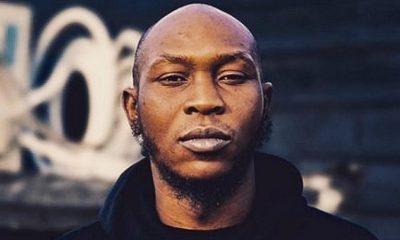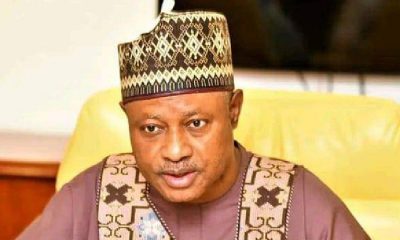News
Pyrates Confraternity not secret cult, says Soyinka

Nobel Laureate, Professor Wole Soyinka, on Friday, described corruption as a deadly cankerworm that lays great nations in ruins and puts the people at a great disadvantage.
Soyinka stated that without attitudinal change and the readiness of everyone to begin to do the right thing, winning the war against the mounting corruption challenge in the country would remain an impossible task.
The world-renowned scholar disclosed this at the 26th Annual Wole Soyinka Lecture organised by the National Association of Seadogs, otherwise known as Pyrates Confraternity, to mark the 90th birthday of Soyinka, who, alongside six other undergraduates of the University of Ibadan, founded the group in 1952.
The lecture, held at the June 12 Cultural Centre, Kuto, Abeokuta, had as its theme, “The Baby or the bathwater: Navigating the dark tunnels of systemic corruption to nationhood”.
Soyinka, while commenting on the lecture delivered by former governor of Lagos State, Mr Babatunde Fashola, said that the challenge of corruption was such that it ran from the top to the bottom in Nigeria, adding that only a collective decision would halt its deadly march in the country.
He said, “The particular aspect of this lecture that struck me is corruption. Corruption is not just when you exchange money; it is a cankerworm that eats deep into the fabric of society from the top to the bottom and corrupts our very nature, our very existence.
“And one aspect of the lecture emphasised that the cure for corruption begins from the inside. Yes, we can talk about institutions, government, and the exercise of power unfairly and inordinately to the disadvantage of the rest of the community as part of corruption, but ultimately, the solution, both short-term and long-term, must begin from the inside, and this is one of the motives for establishing the Pyrates Confraternity 62 years ago.”
Soyinka also used the medium to disabuse the minds of the people regarding misconceptions about the Pyrates Confraternity, saying that the registered association is not a blood-thirsty secret cult but an association founded to push for justice and advance the betterment of the country.
Soyinka, alongside the former Secretary-General of the Commonwealth, Chief Emeka Anyaoku, later unveiled a book “Ship Ahoy,” written to document the 60-year history of the confraternity.
Giving his lecture earlier, Mr Babatunde Fashola, the former two-term Minister of Works and Housing, described Soyinka as not only a gift to the country and the continent but to the entire civilisation.
Speaking on the theme of the lecture, Fashola maintained that while corruption in terms of pecuniary gains is undoubtedly condemned, the worst form of corruption is that which has displaced our highly cherished moral values and has therefore corrupted the people’s ways of life.
He said, “When I was in office as a minister, the Federal Road Safety Corps usually made copies of the monthly reports on road crashes available to me. The report is actually for the office of the Secretary-General of the Federation, but I used to get a copy.
“In October 2022, a total of 1,111 road crashes were reported across the country, out of which 449 people died, representing six per cent of 6458 people involved in the accidents, with 2780 injured.
“The analysis showed a three per cent decrease when compared with the previous month but a 10 per cent increase when compared with the figure for October 2021.
“This goes to show that an average of 400 people are lost monthly to road crashes in the country, but I doubt if the insecurity which is always an issue during campaigns is responsible for such a huge loss of lives every month in the country.”
News
NASS Expected To Tackle Security Challenges Upon Resumption—-Nnamchi

Hon. Prof. Paul Sunday Nnamchi, representing Enugu East/Isi Uzo Federal Constituency, has declared that lawmakers would be expected to prioritize security challenges upon the National Assembly’s resumption after the Eid al-Fitr and Easter breaks.
Speaking with journalists in Abuja, Nnamchi emphasized the need for meaningful engagements on security, economy, and living conditions of Nigerians which had continued to dwindle.
“The insecurity situation is worsening, with farmers being chased off their lands and kidnappers becoming more brazen,” he noted. “We must strengthen our legislative oversight to address these challenges.”
Nnamchi also highlighted the struggles of Nigerians, citing skyrocketing living costs and dwindling incomes. He noted NASS was expected to focus on motions and Bills that would address the expectations of Nigerians.
Regarding his pending Bills, Nnamchi mentioned the University of Agriculture, Ako-Nike, College of Education Eha-Amufu upgrade, and School for Gifted Children, Trans-Ekulu, as likely to be concluded before the 2025 legislative break.
The lawmaker also appealed for increased remuneration for university staff, particularly lecturers, to prevent tertiary education collapse.
News
Kano LGs to contribute N670m for Emir Sanusi’s vehicles

The Kano State government has allegedly directed each of the 44 local government areas in the state to contribute N15,227,272.72, totalling N670m to the Kano Emirate Council.
The amount is for the repairs and purchase of vehicles for the Emir of Kano, Alhaji Muhammadu Sanusi.
The directive, contained in a memo from the Ministry of Local Government, with reference number MLG/INSP/LGD/166T/6, dated March 25, 2025, was addressed to all the local government chairmen.
A palace official, who spoke to The PUNCH on conditiion of anonymity for lack of authorisation, confirmed the authenticity of the memo.
“The company has already been contacted, and plans are in motion to bring in the vehicles and begin the restoration of the vintage ones,” the source disclosed.
According to the memo signed by the Director of Local Government Inspection, Abubakar S. Dabo, on behalf of the Commissioner for Local Government, the approved amount would be deducted from the State/Local Government Joint Account to repair two vehicles and supply four new vehicles to the Emirate Council.
The letter, with the caption, “Conveyance of Approval for the Release of Funds,” sighted by The PUNCH read: “I am directed to convey government’s approval for the release of the aggregate sum of N670,000,000.00 at the rate of N15,227,272.72 per LGA from the State/Local Government Joint Account to repair 2 No. vehicles and supply 4 No. vehicles to the Kano Emirate Council through Sottom Snergy Resources Ltd as per below:
“Complete refurbishing of engine, body and interior of 1993 Fleetwood Cadillac limousine at N25 million and complete refurbishing and rebuilding of both engine, interior and complete body for Daimler D5 420 1998 at N25m.”
The new vehicles to be purchased are one Toyota Hilux pickup 2024 model at N98 million, one Toyota Hiace Bus at N98 million, one Toyota Land Cruiser VXR full option 2024 model at N268 million and one Prado 2024 model at N156m.”
The letter, which was also copied to the Auditor General, Local Government Audit, Kano State and all Zonal Inspectors, Ministry for Local Government, Kano State, directed them to ensure that all due procedures were strictly adhered to.
Reacting, a chieftain of the All Progressives Congress, Alhaji Alhassan Yaryasa, slammed the government for approving the money.
He said, “How can the state government approve this huge amount of money while the residents of the state capital and some other major towns in the state are grappling with water scarcity?
“This is a complete misplacement of priority. How can you spend this money on repairs and purchase of new vehicles for the Emir while other sectors need government attention, especially education and health sectors that have suffered neglect?”
Yaryasa, who was the former coordinator of Tinubu Campaign Organisation for Kano South, called on Governor Abba Yusuf to reconsider the decision and channel the funds to areas where they would be needed most.
“Emir Sanusi does not need new posh cars. Where are the ones he has been using since returning? This is a wasteful expenditure and Kano masses will not forgive them,” he said.
News
NIPOST moves to cashless operations nationwide from July 1

The Nigerian Postal Service (NIPOST) has announced a sweeping reform agenda aimed at transforming the agency into a modern, efficient, and digitally driven institution, with a key policy shift being the adoption of cashless transactions across all its offices.
Starting July 1, 2025, all post office counters in the 774 local government areas of the country will stop accepting cash payments for services.
Customers will instead be required to use approved electronic channels to complete their transactions.
Announcing the development on Monday, NIPOST’s Postmaster General and CEO, Tola Odeyemi, described the move as a major milestone in the agency’s modernisation efforts.
“This is a crucial step in our modernisation journey — one that ensures safer, faster, and more transparent service delivery,” she said.
In a statement signed by NIPOST’s Director of Corporate Communications, Franklin Alao, the agency said the reforms are in alignment with President Bola Tinubu’s Renewed Hope Agenda and are designed to place NIPOST at the centre of Nigeria’s digital transformation.
“With these initiatives, NIPOST is positioning itself as a dynamic, technology-driven player — connecting Nigeria, delivering solutions, and improving lives,” the statement added.
Alao said, “These initiatives mark a new strategic direction for NIPOST under the vision titled, ‘Change of Renewed Hope Berths at NIPOST Shores”.
“The reforms are designed to align the agency with global best practices, the needs of Nigeria’s evolving digital economy, and the Renewed Hope Agenda of President Bola Ahmed Tinubu.
“At the heart of this transformation is NIPOST’s commitment to becoming a modern postal service — one that is driven by innovation, accountability, value, and service excellence.
“We are assuring Nigerians of a revitalised NIPOST that delivers superior service and embraces the future”.
NIPOST commended the Minister of Communications, Innovation, and Digital Economy, Dr. Bosun Tijani, for his unwavering support and leadership.
“The organisation also commended the new Chairman of the NIPOST Board, Barr. Isaac Kekemeke for his passion and strategic foresight since his appointment, and the Postmaster General/CEO, NIPOST, Tola Odeyemi, for her relentless efforts in championing institutional reforms, improving staff welfare, and driving capacity development”, Alao said.
Also, assured that NIPOST would implement a performance-based reward and recognition system to encourage excellence, alongside strict disciplinary measures to uphold organisational integrity.
-

 News16 hours ago
News16 hours agoWhy ‘VeryDarkMan was arrested – EFCC
-

 Education18 hours ago
Education18 hours agoOver 1.5m candidates score less than 200 in 2025 – UTME
-

 Entertainment16 hours ago
Entertainment16 hours agoHow I narrowly escaped death in U.S hotel room – Seun Kuti
-

 News18 hours ago
News18 hours ago‘S3x is good, I enjoy it,’ Bishop Adejumo tells wives
-

 News12 hours ago
News12 hours agoReps Minority Caucus condemns unlawful detention of VDM, demands his immediate release
-

 News19 hours ago
News19 hours agoTinubu to meet Gencos over N4tn electricity debt
-

 News20 hours ago
News20 hours agoA Year After: Rt. Hon. Nnolim Nnaji Reflects On Late Senator Ayogu Eze’s Life
-

 News19 hours ago
News19 hours agoKaduna gov donates SUVs to monarchs, urges unity, peace






